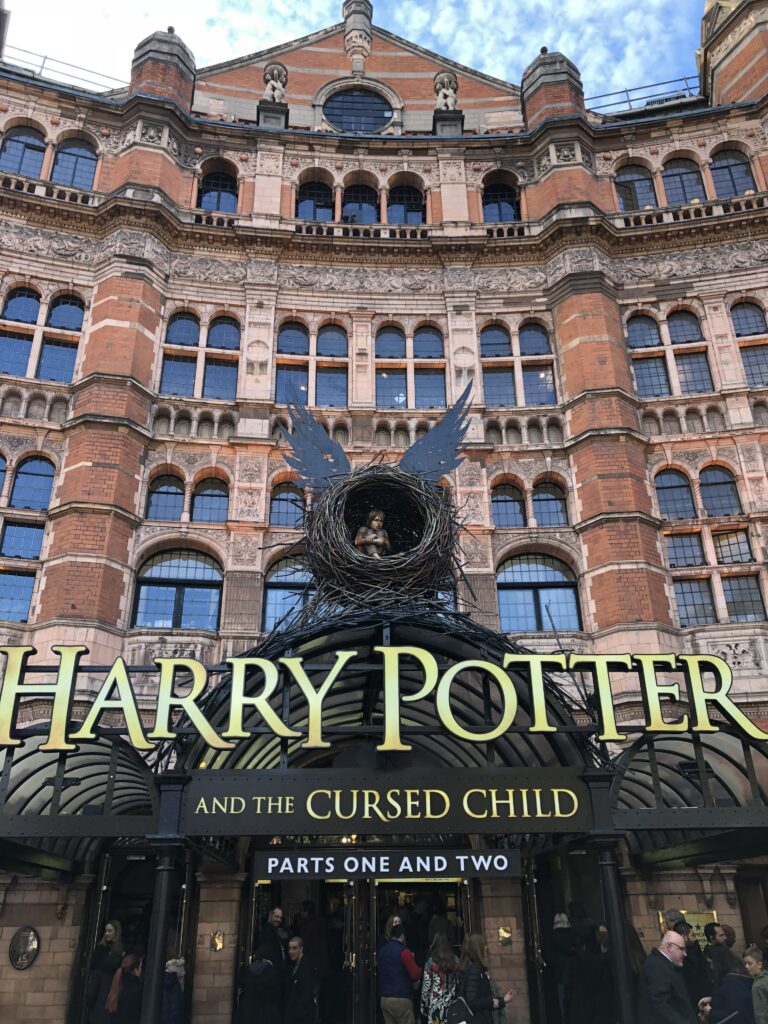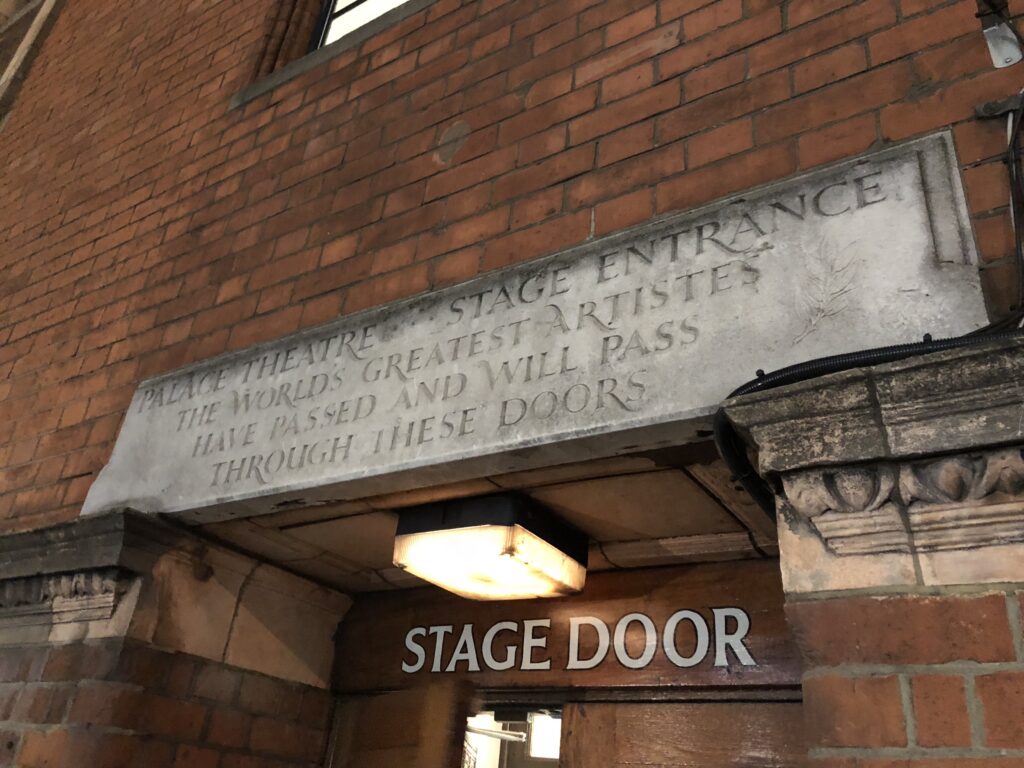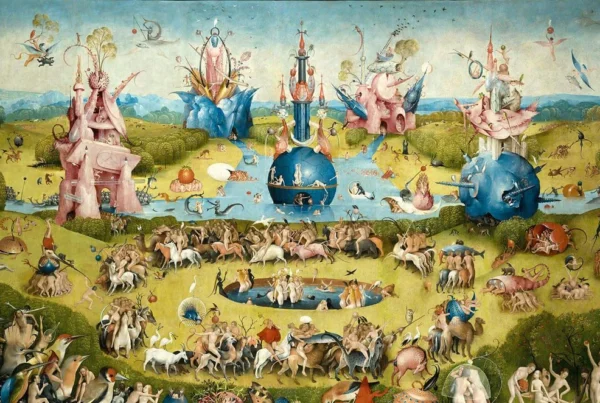 Joe Idris-Roberts is an actor best known for his roles of Albus Potter in the Year 3 cast of Harry Potter and the Cursed Child and Pinocchio in Pinocchio, a musical at the National Theatre. His training includes going to the Royal Academy of Dramatic Arts in London, one of the oldest theatre schools in England. During my time in Highgate, I had the chance to meet with Joe and discuss not only his time in Harry Potter but his other roles as well. We also discussed different experiences he’s had in his life and how they’ve shaped him into the person he is today.
Joe Idris-Roberts is an actor best known for his roles of Albus Potter in the Year 3 cast of Harry Potter and the Cursed Child and Pinocchio in Pinocchio, a musical at the National Theatre. His training includes going to the Royal Academy of Dramatic Arts in London, one of the oldest theatre schools in England. During my time in Highgate, I had the chance to meet with Joe and discuss not only his time in Harry Potter but his other roles as well. We also discussed different experiences he’s had in his life and how they’ve shaped him into the person he is today.
Sundial: Tell us about yourself! How did you first get into acting? Where are you from?
Joe: Well my stage name is Joe Idris Roberts, but my name is just Joe Roberts from Wrexham in North Wales. I distinctly remember doing a Christmas play which was the Nativity we did in the young years. I played the innkeeper’s assistant and the innkeeper was ill one evening. They went, “Oh Joe, do you know the lines?” and I had wanted to do that role so much so I was like, “This is my time!” So that’s pretty much where the bug started. And then when the second year of school came around, and I actually got to study drama as a subject that was brilliantly amazing. So I did all of the after school clubs and also on Saturdays. These Saturday clubs used to be generally doing a musical here or there. And I remember saying something like, “We just want to do a play.” We had never done a play. So we were getting ready to protest at the fact that we wanted to do this play and then the head of the company went, “So why are you not going into acting?” “Oh, well we want to do a play.” And he said, “Allright, we’ll do a play. It’s fine!” And we ended up doing a version of The Golden Pathway Annual, which is like a lovely little piece of post-war time work and growing up in that weird environment where everything is being built up again. So that was fun.
And then I went to the college in my town, Yale. I was surrounded by the well-established, but when I say established I don’t mean famous actors, I just mean really good people who are good at their craft. And that was great to be around and helped me out a lot. Particularly the teacher in drama, because I always knew I wanted to head towards that drama school. Then I applied to the Royal Academy of Dramatic Arts and got through! University is really where you understand what this world is about. And that’s when I started to see the industry and found that actually, there’s a lot of things that are stacked unequally. I started to realize that it’s going to be a struggle and it’s going to take a while to get there, basically. And so, what I always say about drama school is that it’s the “best of times and worst of times”. You will make ground-sweeping mistakes, but that’s the point. That’s how you learn. And yeah, and then this story from drama school until today.
I did my first job in the Orange Tree Theatre in Richmond, it was a Bernard Shaw play. It’s a play called The Philanderer which he wrote because he could never get his plays produced, because they were often talking about really harsh issues, which in the early 1900s was difficult because you had Lord Chamberlain’s Law in this country, where you had to submit everything through a censor and he would decide whether it was good to put on or not. The Philanderer starts with the two male characters making out with each other, implying that they just finished having sex. Imagine that in 1903 and even before that. So that’s why it didn’t make the censor. It was a great first job because I’d studied it and knew who Shaw was. I played the lowest-ranking character in the play and that play is all about status. I played the only working-class character on stage who is seen and I always find him really interesting because the character is so fleeting, but he needs to be there. It wasn’t just like, “I’m playing the server”. There was an engagement there from it. A young actor doing his first work, you’re always gonna find stuff in there, but what I found interesting in that play was that he was the only working-class character, and unfortunately, people don’t recognize him because he seems so small. He doesn’t speak a lot. I found that an interesting parallel to the working-class narrative and how you can often just get ignored because you’re superfluous to the main, interesting bit.
Then I did Pinnochio, which was a massive, massive musical. I’ve never been so tired. It was so demanding because I never left the stage. I had two water breaks in the entire show. One of them was just before my main number in the first act and one of them was one scene in the second act. And then after that scene, I was on the stage for the entire rest of the act. I would do it all over again if they asked me to because I don’t mind. I love the being on stage bit the most. But that was great. There’s not much to say about Pinnochio because it was just so massive, I’m still processing it because I then doubled up doing Potter and had a three-week crossing of Pinnochio in the evening and rehearsing Potter during the day.
Sundial: Was theatre something you were interested in at a young age?
Joe: I’m gonna say it was probably around the single digits. I remember as a kid there were the violins [From Fantasia] I got into my head. And the way they animated it was with these harsh lines at the time and I was like, “I have to be a violinist. That’s what I”m going to be”. I tried the violin, it didn’t work for me, and on that front, instruments are an interesting thing. I think it’s a bit, to be a bit crass now, “the wand chooses the wizard”, I think the instrument chooses the person because you know from the first five minutes of practicing something whether it’s for you, and violin was not right. The guitar was, though! I picked up a guitar and was like, “Oh, this is pretty good!” It’s actually got a fretboard, which I was interested in. Violin is free, but with the guitar, I understood the sounds and that it would happen when I pressed the specific frets. That’s where my love for just being creative came from was that movie and that moment. That desire to achieve something. It was probably the first moment in my life I had that desire to achieve something. One thing I always say is to never lie to your audiences. Yeah, I know we’re putting on silly costumes and saying lines and there’s a load of lights and you’re sitting in this hot space and you just want to get out because you’ve got a meeting in the morning, but if we prevent ourselves from lying, those people who are bored will come with us because they’ll realize we’re telling the truth. We have something important to say. We’re so used to lies in our world now that I feel like once we see it, we lose interest. So it’s really important to tell the truth in this world.
Sundial: You’ve been involved in shows that are just one day and shows that are two shows in one day. Would you be able to walk us through a typical day of each?
Joe: Pinnochio and Potter were jobs that were kind of one-in-the-same, but totally different operations. So the National is still doing this repertory style where you do one day on and then another show comes in, takes a break, and then you go again, which is why everything is all spaced out. You have three days off and then you come back and do a “bring back” call. It’s all very repertory so you share the stage with the actors. And that’s fine because it’s a national institution so it can operate like that. The commercial theatre, I think, is more, “We have to get it done, guys. We’ve only got so much time, the money’s not there, or the money is there but we don’t want to spend it.” And that’s fine because that’s what corporations have to do, you know? That’s the way they have to operate.
But in terms of the Potter setup, you have two-show days and one-show days, matinees and evening shows. If you’re doing a show like Potter where you’ve got Part I and Part II there’s more satisfaction at the end of the day because you’re like, “I’ve told the entire story, there’s been a full stop, I’m at the end,” Whereas when you do a Thursday show with a Part I on Thursday and a Part II on Friday, it’s fine, but there’s something still that you have to take and keep the ball up in the air. There’s something unsaid and that’s an interesting thing to take home with you because sometimes it’s restless and it does affect you in a way because you haven’t finished something. And I’m one of those people that’ll finish a job, no matter how long it takes, I’m gonna finish it, but it’s not fun sitting up just wanting to finish that play.
So yeah, I guess one-show, two-show day, it’s the same. It’s all fine because you just get on with it. It’s easy when you’re just doing a matinee and evening and everything’s just one show over and over again. In that way, I’d say that the two-show days are harder because you have to tell the story twice in one day. You have to go all the way through, have some dinner, and then go through it all again. So it really depends on the contract, I guess. I’m not knocking it because that’s what I get paid for.
Sundial: Do you have any pre-show rituals?
Joe: Not so much every day but before every show opens, and this sounds quite sappy, but my mum’s mum died in ’97, and I remember at the time it being devastating but not really understanding why. There was this narrative of “Grandma’s always with you”, which I took into later life. I remember as a kid, before every show that I did in these theatre schools, these Saturday schools, saying a little prayer to my grandmother. I feel like by saying that, I provide some protection for myself, some protection for the company and for the building, and it just helps me lay the rug out, as it were, of going, “I’m here now and with the people I love. I’m ready to go.” And then, like last night, I do a little ritual of saying, “Right, come on Grandma. We gotta go now, we’re moving on, so come with me. Thanks for all your help”. It’s a bit sappy but that’s one ritual I have. But like I said, that’s not a nightly thing, that’s just the opening and the closing.
The main ritual is playing guitar, my acoustic guitar. I play it loudly and sing as well, and I’m sure that annoys a lot of people in the theatre. Music is the universal language and we all know the sounds. I think everything around the world understands what each piece is saying to you. Whether it’s from the West, the East, the North, or the South, we all get what that message when you listen to it.
Sundial: Do you have any advice for future actors or anyone interested in the theatre world?
Joe: Do your own work! If you think of a play, write it down on a scrap of paper, put it in a drawer, and wait five years to come back to it. You’ll have thought about something where you can relate some scene back to it or whatever. It’s so important in this world to do your own work because the pool is getting slightly smaller. We’ve got an established 20 actors, shall we say, who get all of the parts, who get recast in different things, get to to do the interesting work while the rest of us just . . . whatever. And that’s just how it works, so I’m not complaining. But by doing our own work, we get an opportunity to say what we really want to say. A part of acting is going, “I really want to do this, but you’re my director and I have to do what you say, so that’s fine”. We have to put our own takes on the role to the side, but I think it’s important we get an opportunity to do that, so your own work, especially in this world, is important.
Sundial: And now onto some Harry Potter themed questions. When did you first get into Harry Potter?
Joe: From Day 0. I was born in 1994 and the first book came out in ’97 so I was a bit young reading that. My best friend at primary school, we used to play Harry Potter and they would be Harry Potter and I would be Ron. We’d just make up stories and tales and things, so that shows you how much of a Potter fan I am. Harry Potter is the heart of the millennial lifeblood. It’s defined who we should be as a people, as a generation, because the morals of the story are so high and so good it has been a textbook on how to be a good human being. I thank J.K. Rowling for that because this teaches you so much on how to be not just nice, but good.
Sundial: Favorite spell?
Joe: I don’t know what the name of the spell is (Edit: Non-Verbal Washing Up Charm), but Molly Weasley’s home spells where the dishes wash themselves and the floor sweeps itself, that to me is my idea of heaven. Those would definitely come in handy for me.
Sundial: What is your House?
Joe: Hufflepuff!
Sundial: Patronus?
Joe: For me, it would have to be an otter, because my girlfriend constantly tells me that I’m an otter anyway.
Sundial: Favorite magical creature?
Joe: I’m just going “PHOENIX, PHOENIX, PHOENIX, PHOENIX” in my head because the metaphor of the phoenix goes way back before Potter itself and it’s just so brilliant. You will rise and in the darkest of times, there’s always the light. That’s quoting Dumbledore, isn’t it?
Sundial: Favorite teacher in Hogwarts?
Joe: Remus Lupin. It’s got to be.
Sundial: And least favorite?
Joe: Umbridge!
Sundial: Which characters would you most like to meet?
Joe: Albus Dumbledore and Severus Snape. It’d be fun to see what that was actually all about. I’d just like to sit and watch, to be honest with you. It’s a classic actor response, isn’t it? I’d just like to observe. I don’t make the decisions, I just perform.
Sundial: Favorite book and favorite movie in the series?
Joe: Ahhhh. Favorite book . . . Order of the Phoenix which is a very controversial one. I remember reading it and I think the Order of the Phoenix is the one where it opens the vein and shows you into everything. The stuff you’ve been hearing about, it finally gives you the lowdown on it. Order of the Phoenix, maybe Goblet of Fire. But my favorite film has got to be Azkaban, I love the whole aesthetic. They just flipped it, first it’s medieval and now it’s Victorian, we don’t need to explain it.
Sundial: Do you have a favorite quote off the top of your head?
Joe: Gonna quote Dumbledore because he’s always full of wise words. To relate it back to my grandma, “Those we love never truly leave us”.
Sundial: Dream role?
Joe: Dream role for play has got to be Hamlet, but I mean, doing Hamlet today would be a nightmare because who wants to see a miserable white man, you see them all the time. Musical, something from Sondheim. Anything from Sondheim. I just love Sondheim. He found the way of really communicating. Using phrases and listening to how people talk and translating it to music is just genius to me.
Sundial: Any last things you’d like to say?
Joe: So my friend started this theatre company, it’s a company called “Tiny Room”. We’ve looked at the structure that [theatre] is now, and we’ve decided that we should really be liberating people as much as possible to make the work that they want to make. You shouldn’t be imposing stuff, you shouldn’t be going, “This is how it’s got to be”. So our methodology is really “Anything and Everything” – If you’ve got an idea, we’re gonna find a way of getting that done.” So it’s very interesting now, we’ve put on a show that my friend, who made the company, wrote called “Loop”. The show is about white, young male suicide because it’s a demographic which naturally, in this world, understandably, gets overlooked because of the way the media needs to focus on certain issues and not on other issues. We’re just starting out. We’ve got Twitter and a website, tinyroom.com .


Other posts that may interest you:
- Studying With Cats – Ronron Café
- Parc des Expositions: a Hidden Gem of Reims
- An Interview with a Disneyland Insider
Discover more from The Sundial Press
Subscribe to get the latest posts sent to your email.





